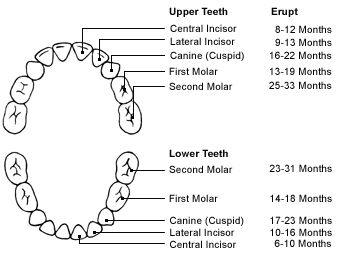Early Dental Care
/Tooth decay is the most common chronic health problem for children; over 40% of children under 6 have some tooth decay. We now know that there's a crucial window of infectivity for the bacteria that cause tooth decay - from the first sign of teeth until 2 to 3 years of age.
For this reason, pediatric dentists recommend that all children should have their 1st dental visit by 1 year of age. That does seem quite early, but the big push in pediatric dentistry these days is prevention - identifying children at high risk for caries, either because of softer enamel, feeding practices, or strains of especially cavity-causing mouth bacteria (streptococcus mutans). And since primary (baby) teeth are important for chewing, talking, and saving space for the permanent teeth, we do like to keep them healthy.
Since babies get their mouth bacteria from their caregivers, make sure you're also taking care of your own teeth and gums - adults with poor oral hygiene and chronic dental or gum infections are more likely to bestow those cooties upon their children. Which is not to say you shouldn't kiss your children ... just do so with healthy teeth if you can.
For international adoptees, we like to have their teeth examined by a dentist in their first few months home, since prenatal and postnatal mineral deficiencies, orphanage feeding practices, and lack of appropriate dental care can lead to softer, irregular enamel, staining from various medication exposures or local high nitrate juices, and CAVITIES! Sometimes lots of 'em.
If your local dentist's office doesn't want anything to do with your kids until they're in school, you may want to find a dentist that is more kid-friendly and more in line with current pediatric dentistry practices. A Google search will reveal a whole cottage industry of online dentist referral sites ... a reasonable place to start is the American Academy of Pediatric Dentistry site, which lists dentists in your area that have completed subspecialty training in pediatric dentistry. Your local family dentist may also have plenty of experience with children, and if they're keeping current, will be interested in seeing your children early, be focussed on prevention, and know how to limit radiation exposure to children.
Dental Resources from Healthy Mothers, Healthy Babies:
- Your Baby’s First Teeth
- What Causes Tooth Decay?
- Dental Care for Infants and Young Children
- Your Child’s Dental Check-ups
- Dental Health for Adolescents And Teens
- Start Motherhood with a Healthy Mouth
10 Simple Ways You Can Protect Your Baby's Smile:
adapted from www.happyteeth.org
1. Lift the lip
Babies change quickly. It is important to lift your baby’s lips and look for changes on your baby’s teeth monthly. If you notice white or brown spots on the teeth, or anything unusual, phone your baby’s dentist or talk to your baby’s doctor.
2. Take your baby to the dentist
All babies should have their teeth checked by a dentist or doctor by the first birthday, unless otherwise recommended by your doctor or dentist.
3. Protect your baby’s teeth with fluoride
Fluoride is a mineral that helps make teeth stronger and better able to fight cavities. Only 58% of cities and towns in Washington have fluoridated water so it is important to check with your baby’s doctor or dentist to see if your child will benefit from fluoride drops or tablets. Charcoal water filters like Brita don't remove much fluoride, but reverse osmosis filters do.
4. Brush daily
Clean your baby’s teeth every night before bed. The younger you start, the easier it is to develop the habit. You can place your child’s head in your lap to allow for enjoyable and effective brushing.
Clean infant gums and first teeth with a moist cloth or small soft toothbrush. Slip-on finger nubbies work well too. For babies with more teeth, use a small (rice grain size) bit of fluoridated toothpaste on a soft toothbrush.
5. Limit sugar
Bacteria that cause cavities feed on sugar. More sugar causes more cavities. Do not give your baby soda pop, and limit juice and soda for all children to special occasions. Offer water at other times when your child is thirsty. Vegetables and fruits are great!
6. No bottles in bed
Formula, milk, and juice cause cavities when left in your baby’s mouth while sleeping. If you must give your baby a bottle in bed, fill it with plain water.
7. Wean from bottle to cup by one year
Begin offering a sippy cup at 6 months; wean from the bottle by age one.
8. Don’t share germs
Cavities are caused by bacteria. Bacteria are passed to babies through saliva. Avoid sharing toothbrushes with your baby. Regular brushing and dental care for you and your children can help lower the risk of spreading cavity-causing bacteria.
9. Help children brush up to age six
Pay attention to bedtime brushing and encourage brushing after breakfast as well.
10. Take care of yourself
Your children learn by watching you. Show them that you value a healthy body and a healthy smile. Brush and floss your teeth, make regular dental visits and take good care of yourself.









